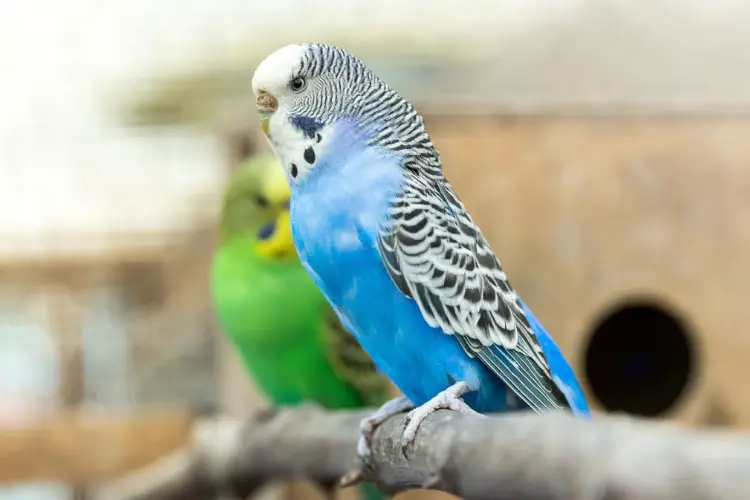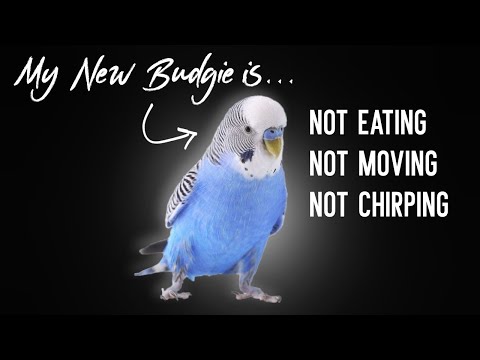Any pet owner’s greatest concern is when their pets suddenly stop eating. When a budgie, also known as a parakeet, fails to eat, it usually indicates something is wrong. Its health deteriorates as a result of a lack of food and water.
So, why isn’t my budgie eating? A budgie may stop eating for various reasons, including illness, dislike of the food served, new surroundings, parasite problems, etc. When they are sick or injured, budgies starve themselves.
When a budgie doesn’t eat, it is never a good sign. You should take action and contact a veterinarian or determine the source of the problem. This article will examine why a budgie may not eat, what to do if it does not, and what natural foods a budgie can eat.
Why is my budgie not eating?
When your budgies stop eating, it is something you should not ignore. It might be an underlying issue that requires immediate attention.
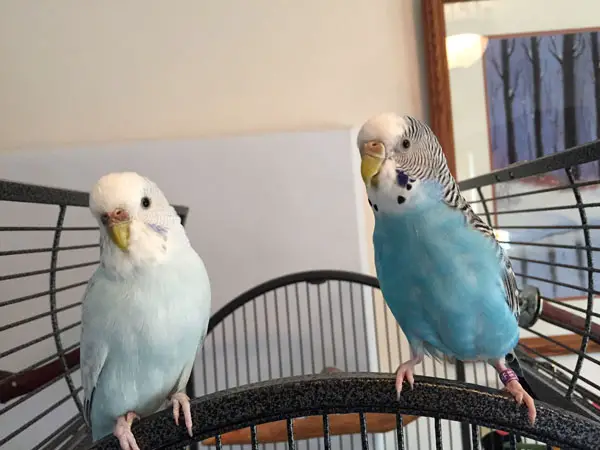
In light of this, let us look at some of the reasons that could be causing the budgie not to eat.
1. A new environment
One of the most common reasons your budgie is not eating is that it is in a new environment that it hasn’t entirely adapted to. If you recently adopted it from a rescue home, the budgie might feel shy to eat when you are around; hence it will stop eating.
Just give your budgie time to be entirely comfortable around its new environment. If it were already a shy bird, even back at the pet store, it would take some more time before it bonds with you.
You can serve the budgie treats from your hand so that it will get used to your scent. However, in the first few days, try not to be always around it.
If the budgie doesn’t eat within 24 hours, call an avian veterinarian to examine it.
2. A new type of food
Budgies can be very picky with what they eat. It may come as a surprise to pet owners who are used to seeing the budgies eat anything presented to them. Budgies only eat food if they like it and when starving.
When you suddenly change the type of food you have been feeding the budgie and introduce a new food, the budgie may be reluctant to try it. You may find them playing with the food instead of eating.
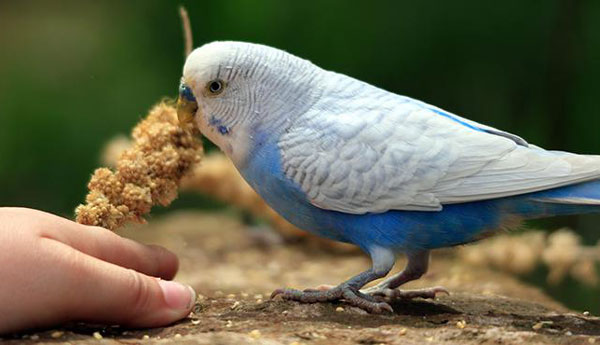
Many avian veterinarians advise feeding budgies the same type of food for the entirety of their lives. However, if you feed it a new food, ensure you introduce it gradually till the budgie is used to it.
3. Parasites and infections
If a budgie has parasites, it will stop eating due to stress. These parasites can be either internal or external, and infections may be bacterial, viral, fungal, or parasitic.
Parasites can cause the budgie to be anorexic, i.e., the budgie fails to eat. The budgie could also display signs such as a change in mood, sluggishness, vomiting, etc.
4. Stress
For example, if a budgie had a playmate in the pet store and is now alone in its cage, it may stop eating due to distress. Or, if the original owner is no longer there, the budgie will feel scared to see a new face.
Also, overcrowding in cages may cause conflict and lead to the stronger budgies bullying the smaller budgies. This might cause the budgies not to eat due to being scared.
5. Change in diet.
If your budgie was used to a diet of vegetables and fruit, changing it to grains and pellets may cause the budgie to stop eating. The sudden change of food may cause intestinal issues for budgies, leading to diarrhea.
According to research, you should ensure that if you do change the budgies diet, ensure the diet is balanced. Unbalanced diets may lead to infections and nutrition-related issues in budgies.
6. Diseases.
Loss of appetite is a sign of illness, so you should not overlook it. When a budgie does not eat, it may indicate that the problem is in the digestive tract.
Internal parasites and inflammatory diseases can cause severe digestive pain.
Diseased budgies will display symptoms like discolored poop and vomiting and may appear passive, among other signs. However, not eating might not always indicate the budgie’s being unwell.
Can Budgies Starve Themselves
Yes, budgies can self-starve if they are ill, injured, afraid, stressed, or dislike food. For instance, a parakeet may be unable to eat due to a digestive issue or an overgrown beak.
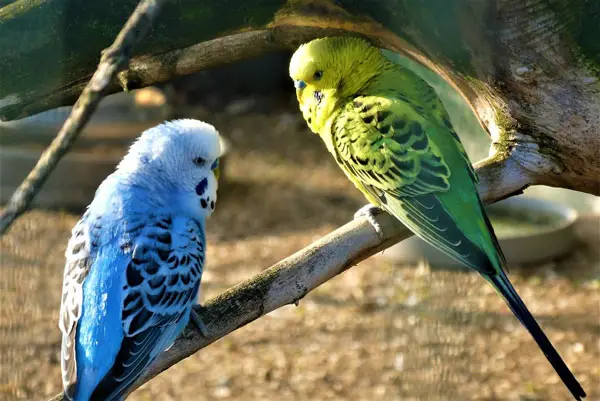
Appetite loss is a symptom of numerous fungal, bacterial, and parasitic illnesses and diseases. It is essential to contact a veterinarian because budgies can die within 24 hours if they do not eat food or drink water. You can reduce stress by keeping budgies in separate cages.
Occasionally, provide your budgie with its favorite treats, making it feel secure enough to eat again.
Also read: Are Budgies Good For Beginners?
How To Get A Budgie To Eat?
The simplest ways of getting your budgie to eat involve creating an environment that accommodates the budgie,e.g.,
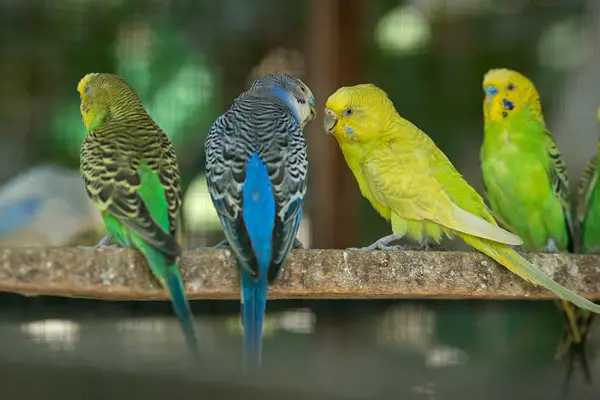
- If it is a newly adopted budgie, ensure you keep its cage in an area with less traffic. Your budgie will get scared if it keeps seeing new faces around its cage and thus not eat.
- You can partly cover its cage to make it feel more secure. This can help them eat without worrying about predators. However, ensure not to cover the whole cage because budgies do not like total darkness, and you may end up scaring it even more.
- Do not linger around the budgie’s cage. You could occasionally let it feed off your hand as a way of bonding with it.
- Ensure the food and water bowl are easily accessible to them.
- Do not change the budgies diet suddenly. Change it gradually by mixing the new diet with the usual food.
After a while, your little feathered pet will get used to its new home and start eating right before you. Just give it time.
How Long Can a Budgie Go Without Food?
Budgies can go for 24-48 hours without food. They burn a lot of calories when flying around, so they can not survive for long without food. Parakeets have limited fat resources and a very high metabolism, so they need to eat often.
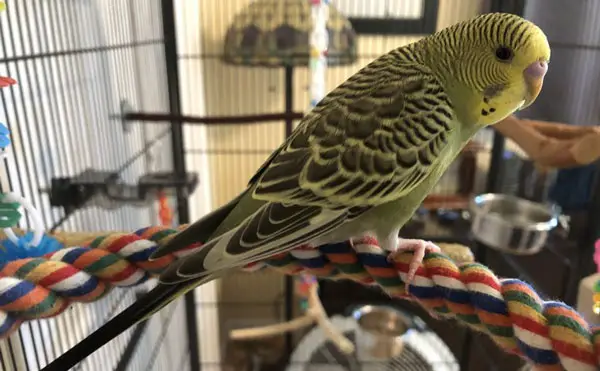
If your budgie has not eaten within 24 hours, ensure you take it to the vet. Also, ensure you provide the budgie with the food they like because they are picky eaters and can refuse to eat some foods.
Video of why a budgie is not eating
Here is a video showing why budgies may refuse to eat and when to know whether your budgie is refusing to eat because it is ill.
What To Do If your Budgie Is Not Eating
We have looked at why a budgie is not eating. So, let’s now consider what to do if your budgie is not eating. Here are some actions you can take.
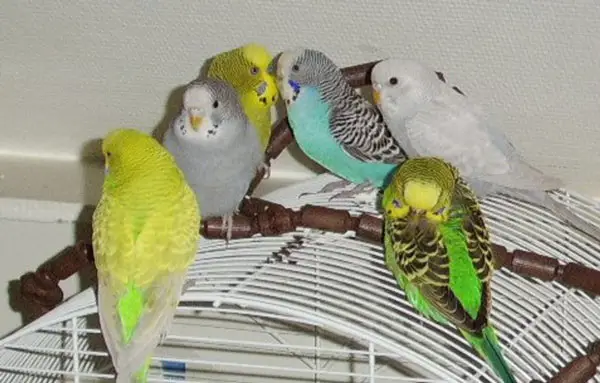
- Cleaning your budgies’ cage; if the budgies’ cage is dirty with leftover food or bird droppings, the budgie may refuse to eat in such an environment. So ensure you clean the cage and the feeding bowls too.
- Provide a variety of food; budgies need a variety of food, so they do not get bored with the same type of food and stop eating it.
- You can also entice your budgie to eat its food. You can employ some ideas such as offering veggies on your hand or eating fruits and veggies in front of your budgie.
- Keep your budgies warm; budgies may refuse to eat due to cold temperatures. You could maintain a warm room temperature and feed the budgies energy-giving foods.
- Make your budgies feel safe; do not put budgie cages near a dog’s or cat’s resting place. The budgie might stop eating because they feel afraid.
Related: Do Budgies Need Darkness To Sleep?
Related Questions
Here are some questions people ask about why their budgies are not eating.
A budgie should eat approximately 1.5 to 2 tablespoons of seeds or pellets, which you should supplement with a portion of fresh fruits and vegetables. Additionally, you could include supplements and treats approximately once per week for an added boost of vitamins and minerals.
Some foods are bad for your budgie and should not be fed to them,e.g.,
1. Avocado
2. Chocolate
3. Cherries, apricots, and peach stones
4. Apple seeds
5. Bread
6. Cheese
7. Citrus fruits
8. Dairy
9. Seafood
10. Salt
11. Green tomatoes
Yes, budgies are picky eaters. They tend to choose the food they like or are used to over new food. Budgies refuse to eat food they do not like.
Conclusion
If your budgie is not eating, it might be worrying, but at times it is because the budgie has not fully adapted to its new environment or new food. However, other times it is because of an underlying issue such as being ill.
As a budgie owner, do not force the budgie to eat. Just give it time. You can also ensure the budgie feels safe and that they have access to food and water to help them eat again.
Remember not to overlook when a budgie stops eating. Observe the budgie for a day; if it still does not eat, contact an avian veterinarian.
All the best with your little feathered friend!
